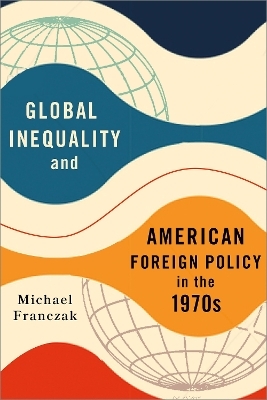
Global Inequality and American Foreign Policy in the 1970s
Seiten
2022
Cornell University Press (Verlag)
9781501763915 (ISBN)
Cornell University Press (Verlag)
9781501763915 (ISBN)
In Global Inequality and American Foreign Policy in the 1970s, Michael Franczak demonstrates how Third World solidarity around the New International Economic Order (NIEO) forced US presidents from Richard Nixon to Ronald Reagan to consolidate American hegemony over an international economic order under attack abroad and lacking support at home. The goal of the nations that supported NIEO was to negotiate a redistribution of money and power from the global North to the global South. Their weapon was control over the major commodities—in particular oil—that undergirded the prosperity of the United States and Europe after World War II.
Using newly available archival sources, as well as interviews with key administration officials, Franczak reveals how the NIEO and "North-South dialogue" negotiations brought global inequality to the forefront of US national security. The challenges posed by NIEO became an inflection point for some of the greatest economic, political, and moral crises of 1970s America, including the end of golden age liberalism and the return of the market, the splintering of the Democratic Party and the building of the Reagan coalition, and the rise of human rights in US foreign policy in the wake of the Vietnam War. The policy debates and decisions toward the NIEO were pivotal moments in the histories of three ideological trends—neoliberalism, neoconservatism, and human rights—that formed the core of America's post–Cold War foreign policy.
Using newly available archival sources, as well as interviews with key administration officials, Franczak reveals how the NIEO and "North-South dialogue" negotiations brought global inequality to the forefront of US national security. The challenges posed by NIEO became an inflection point for some of the greatest economic, political, and moral crises of 1970s America, including the end of golden age liberalism and the return of the market, the splintering of the Democratic Party and the building of the Reagan coalition, and the rise of human rights in US foreign policy in the wake of the Vietnam War. The policy debates and decisions toward the NIEO were pivotal moments in the histories of three ideological trends—neoliberalism, neoconservatism, and human rights—that formed the core of America's post–Cold War foreign policy.
Michael Franczak is a Postdoctoral Fellow in Global Order at the University of Pennsylvania's Perry World House.
Introduction
1. Food Power and Free Markets
2. North-North Dialogues: The NIEO and Transatlantic Relations
3. Neoconservatives and the NIEO at the United Nations
4. Interdependence, Development, and Jimmy Carter
5. Debt, Development, and Human Rights: The Dialogue in Latin America
6. Basic Needs and Appropriate Technology
7. The Reagan Revolution and the End of the North-South Dialogue
Epilogue
| Erscheinungsdatum | 07.05.2022 |
|---|---|
| Verlagsort | Ithaca |
| Sprache | englisch |
| Maße | 152 x 229 mm |
| Gewicht | 907 g |
| Themenwelt | Geisteswissenschaften ► Geschichte ► Allgemeine Geschichte |
| Geisteswissenschaften ► Geschichte ► Regional- / Ländergeschichte | |
| Sozialwissenschaften ► Politik / Verwaltung ► Europäische / Internationale Politik | |
| ISBN-13 | 9781501763915 / 9781501763915 |
| Zustand | Neuware |
| Informationen gemäß Produktsicherheitsverordnung (GPSR) | |
| Haben Sie eine Frage zum Produkt? |
Mehr entdecken
aus dem Bereich
aus dem Bereich
eine Reise um die Welt zu außergewöhnlichen Persönlichkeiten, …
Buch | Softcover (2023)
Piper (Verlag)
CHF 25,20
Eine wahre Geschichte von Schiffbruch, Mord und Meuterei
Buch | Hardcover (2024)
C.Bertelsmann (Verlag)
CHF 34,95


